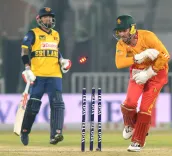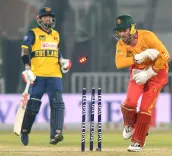Why Have 7 Companies and 40 Medicines Been Banned in Rajasthan in 2025?

Synopsis
Key Takeaways
- Rajasthan Medical and Health Department is enforcing strict quality standards.
- 7 companies and 40 medicines have been banned in 2025 for non-compliance.
- The Chief Minister's Free Medicine Scheme aims to ensure public access to quality medicines.
- A comprehensive quality-testing mechanism is in place to prevent substandard medicines.
- Actions taken reflect a zero-tolerance policy toward negligence in healthcare.
Jaipur, Nov 20 (NationPress) The Rajasthan Medical and Health Department is ramping up its efforts to enhance healthcare standards and provide superior services to the public by implementing a zero-tolerance policy against negligence and irregularities.
The department has undertaken significant measures to ensure the availability of quality medicines under the Chief Minister's Free Medicine Scheme.
The Rajasthan Medical Services Corporation (RMSC) has prohibited 7 companies and 40 medicines this year due to their failure to comply with quality standards during inspections—marking the most extensive action taken since the Corporation's inception.
Medical and Health Minister Gajendra Singh Khinvsar emphasized that while the effective operation of the Free Medicine Scheme is crucial, providing only high-standard medicines is the foremost concern.
He mentioned that stringent measures are being enforced against companies that do not meet quality criteria, leading to the banning of 7 firms and 40 products in 2025—a record since the Corporation was founded.
Principal Secretary Gayatri Rathore highlighted that from 2011–12 to 2024–25, only 26 companies faced bans. In stark contrast, seven pharmaceutical firms have already been banned in the 2025–26 financial year for supplying or failing to supply substandard medicines.
Moreover, 40 medicines have been banned this year alone—again, the highest number recorded in any financial year. Fines have also been imposed in six instances.
RMSC Managing Director Pukhraj Sen elaborated that the Corporation has established a comprehensive quality-testing system to ensure that substandard medications do not reach hospitals.
All medicines acquired from suppliers are initially stored in quarantine at district drug stores. Each batch is tested by laboratories authorized by the RMSC. Only those batches that adhere to quality standards are released for hospital distribution via the e-medicine software. Any batches that fail to meet quality criteria are instantly rejected.
If a drug sample does not pass initial testing, it is forwarded to the State Drug Testing Laboratory for validation. A letter is dispatched to the Drug Controller, who collects independent samples from district drug stores for testing at the state laboratory.
In addition to RMSC testing, district drug control officials also gather random samples. Once a substandard report is confirmed, the case is submitted to the Disciplinary Committee, where the involved firm is notified and given a chance to present its case.
Based on the findings, the Committee then decides to ban or penalize the firm or product according to guidelines related to tender violations, blacklisting, and debarment.
In 2025, the corporation has barred five firms for five years for supplying substandard or adulterated medicines. This list includes M/s Arien Healthcare, which produces Ciprofloxacin and Dexamethasone Eye/Ear Drops, M/s Agron Remedies Pvt. Ltd for Cefuroxime Axetil Tablets, Tobramycin Eye Drops, M/s Effi Parenterals for Calcium and Vitamin D3 Tablets, Jpee Drugs for Calcium and Vitamin D3 Suspension, and Sai Parenterals Ltd for Heparin Sodium Injection. Additionally, two other firms have been banned for three years due to service condition violations: M/s Biogenetic Drugs Pvt. Ltd and M/s Smilex Healthcare Drug Company.
A total of 40 medicines have been prohibited from sale and marketing after testing confirmed their substandard status. These include: Primaquine Tablets from M/s Maxwell Life Sciences Pvt. Ltd and M/s Scott Edil Pharmacia Ltd, Heparin Sodium Injection and Calcium & Vitamin D3 Suspension from M/s Yakka Pharmaceuticals Pvt. Ltd (banned for 3 years), Fexofenadine Tablets from M/s Santlife Pharmaceuticals Ltd, Levetiracetam Tablets and Clopidogrel + Aspirin Tablets from M/s Life Max Cancer Laboratories, and Calcitriol Capsules from M/s Titanium Technologies (India) Pvt. Ltd, among others.









